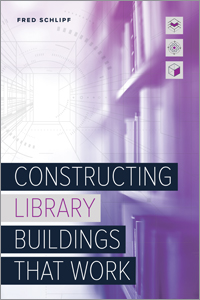Primary tabs
You don't need to be an ALA Member to purchase from the ALA Store, but you'll be asked to create an online account/profile during checkout to proceed. This Web Account is for both Members and non-Members. Note that your ALA Member discount will be applied at the final step of the checkout process.
If you are Tax-Exempt, please verify that your account is currently set up as exempt before placing your order, as our new fulfillment center will need current documentation. Learn how to verify here.
- Description
- Table of Contents
- About the author
- Reviews
When it’s time to start planning for a renovation or construction project, you don’t need a book that covers everything from A to Z. Instead you need a concentrated set of tools and techniques that will guide you and your team to find the best solutions for your specific project. That’s exactly what library building expert Schlipf provides in his new book, which will be a key resource for library directors, administrators, board members, trustees, and planning professionals. Pinpointing the elements that make library buildings functional, in this book readers will find
- a streamlined organization of the text that enables quick consultation and facilitates collaboration;
- concise coverage of the essentials of the library construction process, including who does what, how things work, and how to stay out of trouble along the way;
- advice on important planning and workflow considerations such as site selection, schematic design, funding, design development, the bidding process, construction, and post-construction occupancy;
- discussion of the characteristics of successful library buildings—buildings that are easy to maintain, welcoming to people with disabilities, have less trouble-prone restrooms, and provide security for users, staff, and collections; and
- an overview of bad ideas in library architecture, with pointed guidance on how to steer clear of them from the very beginning of your project.
This powerful primer will help everyone involved in a library building project stay focused on the task at hand.
Preface
Introduction
Part I Basics of the Library Construction Process
- Chapter 1 Basic Building Configuration
- Chapter 2 Programming
- Chapter 3 Hiring Architects
- Chapter 4 Site Selection
- Chapter 5 The Design and Construction Process
- Chapter 6 Funding
- Chapter 7 Remodeling vs. New Construction
- Chapter 8 Converting Non-Library Spaces
Part II Characteristics of Successful Library Buildings
- Chapter 9 Accessibility
- Chapter 10 Acoustics
- Chapter 11 Efficient Operation
- Chapter 12 Electrical Wiring
- Chapter 13 Elevators and Staircases
- Chapter 14 Expandability
- Chapter 15 Flexibility
- Chapter 16 Furniture
- Chapter 17 HVAC Systems
- Chapter 18 Lighting
- Chapter 19 Meeting and Program Rooms
- Chapter 20 Plumbing
- Chapter 21 Security
- Chapter 22 Service Desks
- Chapter 23 Shelving
- Chapter 24 Staff Workspaces
- Chapter 25 Storage Spaces
- Chapter 26 Good and Bad Ideas in Library Architecture
Fred Schlipf
Fred Schlipf has been hanging out in library buildings since the early 1940s (at about the age of four, he turned out all the lights in the Detroit Lakes (Minnesota) Public Library one evening—a happy moment that is still both bright and dark in his memory), and has been working for libraries and teaching about libraries and consulting on library buildings since he was 17. He’s been a library school faculty member for over 50 years, and he spent nearly 33 years as director of The Urbana Free Library, the public library of Urbana, Illinois (just down the street from the University of Illinois). He’s done formal building consulting for between 150 and 200 libraries and quick consulting for many more, and he visits library buildings everywhere he goes. He has a BA from Carleton College and an MA and PhD from the Graduate Library School of the University of Chicago. He has served on dozens of committees and task forces of the American Library Association, Illinois State Library, Illinois Library Association, local library groups in Illinois, and the Illuminating Engineering Society of North America. He was Illinois Librarian of the Year in 2000.
"The reader is methodically taken through the various steps of any library renovation or building project from considering the shape of the building, hiring architectural firms, and funding, to the materials used, staff spaces, and even a final word about the 'good and bad ideas of library architecture' (p. 65) ... Constructing Library Buildings That Work contains many facets that should inform both the veteran library renovation committee member as well as the novice member. Librarians in both public libraries and academic libraries will find information that can inform their pursuit of a more pleasing library space for themselves and their patrons."
— Jennifer Matthews, Collection Strategy Librarian, Rowan University



